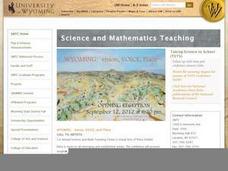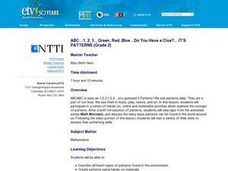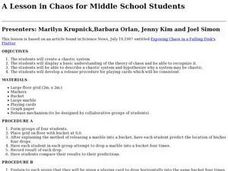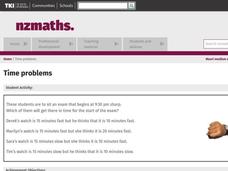Curated OER
Probability Plus
Students participate in a variety of activities to understand statistics. They collect and interpret data. Also students distinguish the difference between a population and a sample. They make inferences and create arguments using data.
Curated OER
ABC...1, 2, 3...Green, Red, Blue...Do You Have a Clue?... IT'S PATTERNS
Second graders view clips from the animated series Math Monsters, and discuss the many ways patterns can be found in the world around us. Following the video portion of the lesson, 2nd graders visit a variety of Web sites to assess their...
Curated OER
Min-Max temperatures
Young scholars investigate data of minimum and maximum weather temperatures over the period of one week. They answer guided questions in order to establish comprehension of interpreting the data.
Curated OER
A Lesson in Chaos for Middle School Students
Students create a chaotic system. They display a basic knowledge of the system and are able to recognize it. The students form a hypothesis about a chaotic system and theorize the cause and effect.
Curated OER
Spheres
Young scholars work algebraic expressions with various types of powers to find the solutions. They Students also become familiar with problems that involve the square roots of numbers. The work should be completed with computational...
Curated OER
The Lady's Age
Students use a game to establish the context of solving problems in a systematic and mathematical fashion. They also solve various types of equations to find reasonable solutions.
Curated OER
Rows of Numbers
Students generate patterns from a structured situation, find a rule for the general term, and express it in words and symbols. They also devise and use problem solving strategies in a systematic way.
Curated OER
Time Problems
Students make sensible estimates and check for reasonable results. They also solve problems with positive and negative integers using practical activities or models as needed.
Curated OER
Square and Triangular Numbers
Students use equations to represent practical situations. They solve linear equations and quadratic equations. The use of problem solving strategies is also developed.
Curated OER
Square Milk Bottle Crates
Learners attempt a problem that Students has the potential to have more than one solution. Hence the problem is accessible to a wide range of learners. The problem is essentially about finding patterns and this is typical of a number of...
Curated OER
Lara's Equiprobable Dice
Students try some new exercises involving probability. These are, first of all, that the probability of getting a given total when two dice are rolled is equal to the number of possible ways of getting that total, divided by 36 (the...
Curated OER
What is s and t?
Students formulate and solve various types of equations. They become familiar with different types of patterns and apply the knowledge to solving mathematical problems from analyzing them.
Curated OER
Brian's Pegboard II
Students are able to assess a problem and use systematic methods to solve the problem. They also find out all the possible outcomes for a sequence of events using tree diagrams.
Curated OER
Bubblegum balls
Learners look for patterns to solve problems involving statistics using different colored gumballs. They should be able to look for and find out all the possible outcomes based upon inference and trials.
Curated OER
Space Crossing
Learners critically follow a chain of reasoning to devise a decent problem solving technique to be applied to a reasonable problem. They also examine how to use logical arguments.
Curated OER
Weighing Time
Young scholars devise a strategy to solve problems that is done in a systematic and mathematical fashion. The finding of the unknown value is the focus of the lesson. To solve linear equations proficiently is the skill of the lesson.
Curated OER
Base 3
Learners investigate this problem that aims to give a better idea of our decimal system by looking at a comparable system - the base 3 system. By seeing how base 3 numbers work students should have a better appreciation of base 10...
Curated OER
Are You Absolutely Sure of the Value?
Seventh graders develop an examineing of absolute value through real world situations. They develop an examineing of when absolute value can be used in a given situation.
Curated OER
Transformations
Tenth graders recognize, perform and derive rules for basic transformations including translation, reflection and rotation. They also consider compositions, a combination of two or more basic transformations. Students explore both...
Curated OER
Number Subsets: Winning the Number Game
Eighth graders review their examineing about numbers and number systems through playing the Number Game. They create a list of numbers and based upon the characteristics and properties of the numbers they earn points.
Curated OER
Representing the Unknown
Second graders solve number sentences and examine how to apply basic operations of mathematics to those problems. They also use symbols to represent unknown numbers and how they are used in equations.
Curated OER
Using Representations to Model Problems
student make predictions or draw conclusions based on physical and visual representations of profit and sales. They model problems with physical materials and visual representations, and use models, graphs and tables to draw conclusions...
Curated OER
Is It Likely or Is It Unlikely?
n a class discussion Students identify events or situations as being likely to occur or unlikely to occur. Then, they work in pairs to generate likely and unlikely statements to share with the class.
Curated OER
ndirect Measurement Technique: Using Trigonometric Ratios
Ninth graders find the height of an object that would be difficult or impossible to measure directly. They construct and use a Clinometer to measure the angle of elevation (or depression). Students create a sketch of the measurement...

























